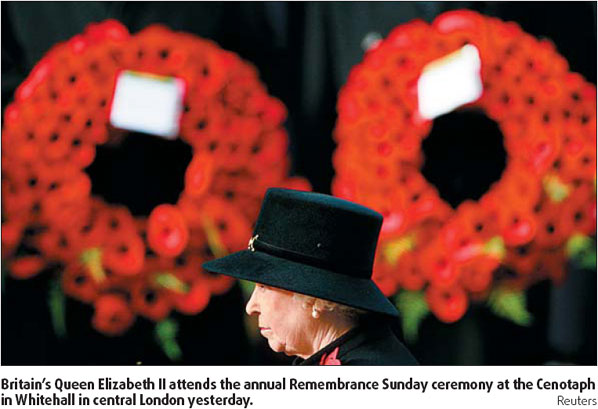100,000 bodies unaccounted 90 years after WWI battle

Belgian King Albert laid a wreath yesterday at the Monument to the Unknown Soldier while thousands flocked to the site of one of bloodiest battles of World War I (WWI) in western Belgium to mark the 90th anniversary of the war's end.
Ceremonies across Britain, France and Belgium were held on Armistice Day to commemorate the end of the war.
In London, Queen Elizabeth II paid silent tribute at the Cenotaph memorial to those who have died serving Britain since WWI. For the first time, Prince William, wearing his military uniform and carrying a sword, joined senior members of Britain's royal family in laying wreaths at the monument.
In western Belgium, officials expected more than 10,000 visitors to the 150 war cemeteries dotting Flanders Fields.
Experts believe 100,000 soldiers remain unaccounted for 90 years after the end of one of the bloodiest fights, the Battle of Passchendaele, which ended with the capture of a small village church and left 500,000 soldiers from Britain, Australia, Canada and New Zealand dead, wounded or missing.
"There are 100,000 bodies in the ground still to be found," said Franky Bostyn, curator of the Memorial Museum Passchendaele 1917. "Every year, 40 to 50 are officially declared, or found."
Over the weekend, thousands made the pilgrimage to Passchendaele to pay tribute to those who died during the 1917 battle that pitted British-led forces from across the British Empire, including soldiers from Canada and other former colonies, against Germany.
Jim Prentice, Canada's industry minister, and his wife, Karen, led a Canadian tribute on Saturday to the tiny village.
Prentice honored his great uncle, Private Roy Urquhart, who fought and died during the opening hours of the Canadian offensive on October 26, 1917, that led to the end of the battle. At the end, only 8 km of land had been gained but the fight helped end the war by depleting German troop and machinery reserves.
The battle was called to a halt after Canadian reinforcements replaced devastated British, Australian and New Zealand units near Passchendaele and captured the ruined village on November 10, 1917.
Urquhart was 22 when he died. His body was never recovered. Prentice stood near the spot where he believes his great uncle was killed trying to reach a ridge where German machine guns cut down thousands of Commonwealth troops.
His great uncle's name is listed among the 55,000 missing soldiers engraved on the walls of the arched limestone Menen Gate war memorial in nearby Ieper, better known to the soldiers by its French name, Ypres.
A further 35,000 names of the missing are listed on memorial walls at the Tyne Cot military cemetery, which contains 12,000 graves - making it the largest Commonwealth military burial site in the world.
Agencies
(China Daily 11/12/2007 page6)














